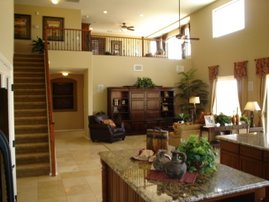PART 2 of 3
Should you buy new or old construction? When I started investing in real estate, I lived in Los Angeles, California. The available homes for sale were typically 50 to 80 years old. The option of buying new in the area was very limited and very expensive due to shortages in residential lots to build on. Here in Arizona, the opposite is true. There are new subdivisions popping up every day with huge inventories of new homes. Having invested in both new and old construction, it is my opinion that "new" is the only way to go when possible.
Think about the following before you buy: New homes typically have a 2/10 warranty attached to them. That means if anything goes wrong with the home in the first 2 years, the builder will make the repairs at no cost to you. The "10" in the 2/10 warranty refers to the structural components of the home. If you have structure related issues, the builder is obligated, under the warranty, to correct the issue(s) for up to 10 years. The 2/10 warranty is something you won't find offered on older homes. An older home may come with a 1 year warranty such as American Home Shield, but if you read the details of the warranty, you'll find their liability is very limited and there are deductibles you'll have to pay with each and every service call.
New construction has the advantage of very attractive entry points into the market. In a down real estate market, builders become desperate to unload their inventories of homes. It is not unusual to see price reductions of 20% to 30% when inventories rise, not to mention other incentives like paid closing costs and discounts on upgrades. The typical homeowner selling his or her home just can't compete with that. Builders can sell their homes for just about whatever they want as long as there's a profit in it for them. The typical homeowner has a mortgage that limits just how low they can price their home. Most homeowners see the builders as the enemy in a down real estate market because of the constant downward pressure on pricing. This, however, is music to the ears of the investor. Correcting real estate markets mark the sign of frenzied buying by those investors sitting on cash looking to find a bargain. Down cycles are a time of massive real estate accumulation for most investors as they yell to the heavens "load up and buy as much as you can afford". Homeowners on the other hand are not as full of glee and optimism. No, for them, it's pretty much doom and gloom.
Older homes do have their place. If you want that one of a kind view home in the hills overlooking the city, you may be quite content with it's age, especially if it's in good condition. You may have a specific neighborhood in mind or area you favor investing in that's completely built-out. In that case, an older home may fit the bill. Just keep in mind, older homes usually mean older plumbing and electrical components that may need updating, greater chance of pervasive termite infestation, leaky roof possibilities, and antiquated decor. Make sure you hire a licensed inspector to reduce your chances of buying an unsound property. The cost of hiring an inspector is well worth the money and may serve to help you keep your money from falling into a money pit of repairs.
Wednesday, August 15, 2007
Subscribe to:
Comments (Atom)

